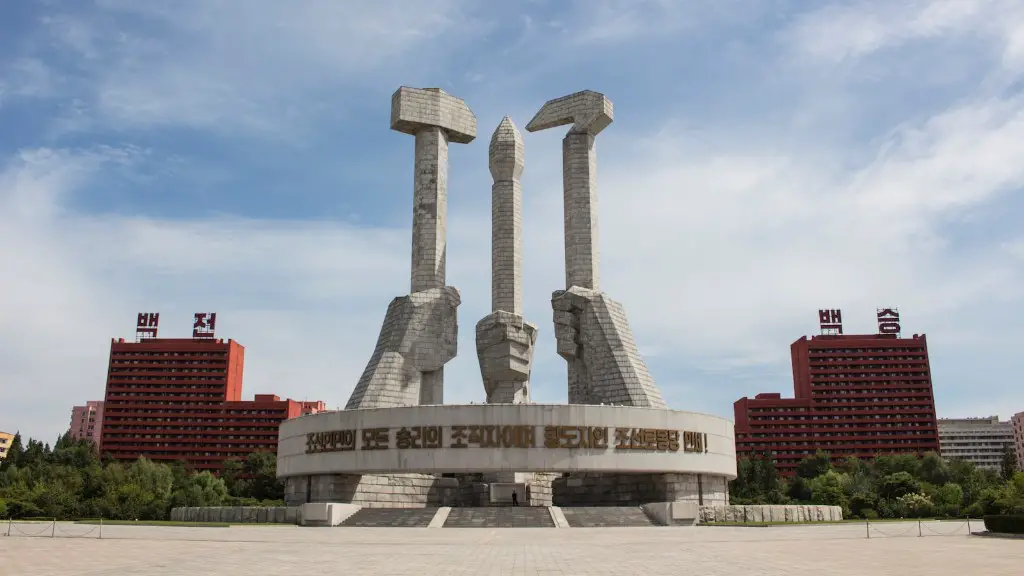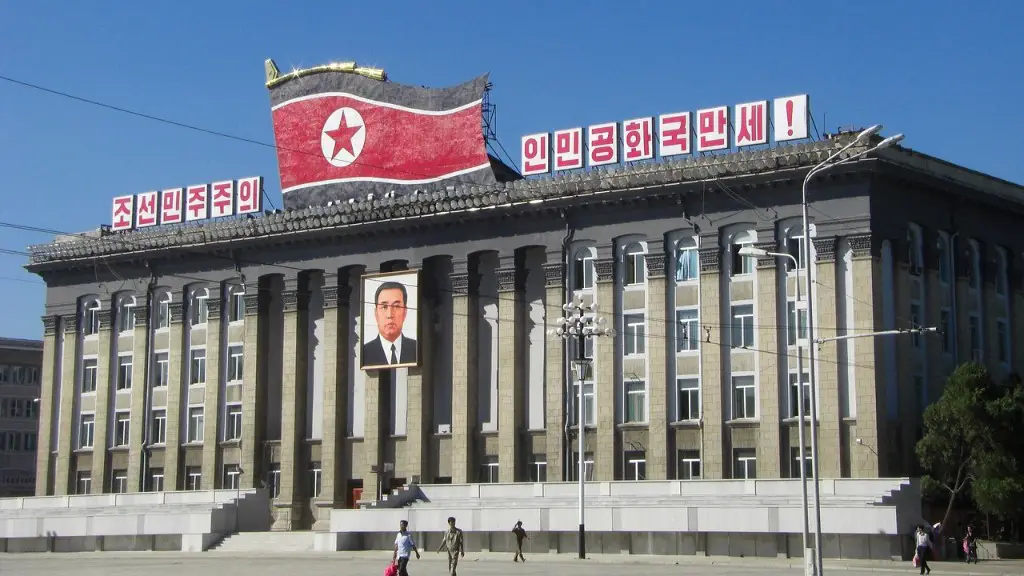Background of North Korea
North Korea, officially known as the Democratic People’s Republic of Korea, is a country that is located in the eastern part of Asia, on the northern half of the Korean Peninsula. It is bordered by China on one side, and South Korea on the other. North Korea has been under a Communist-style government since its establishment in 1948. The country is widely known to be heavily closed off and secretive, with very limited foreign relations. The North Korean government has been under the rule of the Kim family since its inception, with Kim Jong-un currently serving as its supreme leader.
North Korea is one of the few countries in the world that has yet to sign the Nuclear Non-Proliferation Treaty. It is also the only state that is known to have tested nuclear weapons in recent history. It is estimated that it has anywhere from 10 to 20 operational nuclear weapons stockpiles, and is currently in the process of developing more.
Reasons for the Development of Nuclear Weapons
There are many reasons behind why North Korea is developing nuclear weapons. One of the primary reasons is political. The North Korean government sees nuclear weapons as a form of deterrent; they want to be able to project strength, both domestically and internationally, and to ensure the security of their government. Additionally, they want to make sure that they have the upper hand in any possible international negotiations or conflicts. North Korea is also keenly aware of the fact that nuclear weapons provide countries with great geopolitical advantages, and they want to make sure that they do not fall behind in terms of power and influence.
Another reason behind why North Korea is developing nuclear weapons is in response to the threat of the United States and its allies. The North Korean government is well aware of the fact that the US is an influential global superpower, and that it has a history of waging war against any country that it perceives to be a threat. By developing nuclear weapons, North Korea is attempting to use them as a way to counter any possible threats from the US.
Finally, North Korea is also attempting to use nuclear weapons as a way to gain international legitimacy. Having nuclear weapons would show the international community that North Korea is a powerful nation that should be taken seriously. At the same time, it could also potentially help open up diplomatic lines, which would in turn help the country gain foreign aid and resources.
Implications of North Korean Nuclear Weapons
The implications of North Korean nuclear weapons are potentially dangerous. North Korea having nuclear weapons brings forth the threat of nuclear warfare which poses a very real risk to the international community. In addition, North Korea is a relatively isolated country, and having nuclear weapons would give them the chance to develop an international power base that could be used to advance their agenda. Moreover, the presence of nuclear weapons could also increase regional tensions, as countries in the region may feel the need to develop their own weapons in order to counterbalance North Korea’s growing power.
Furthermore, the development of nuclear weapons could also have serious economic implications. The cost and upkeep of nuclear weapons is very high, and would have to be paid for by the citizens of North Korea, who are already struggling with economic hardships. Additionally, the development of nuclear weapons could attract economic sanctions from other countries, which would further hamper their economic development.
Moreover, nuclear proliferation can have the effect of destabilizing the region and leading to increased militarization. Countries in the region may be further incentivized to develop their own nuclear weapons, which could lead to an arms race. This could bring about a heightened sense of insecurity and mistrust in the region, and could potentially lead to military conflicts between states.
United Nations On North Korea
The United Nations has taken a strong stance against North Korea’s development of nuclear weapons. In 2006, they adopted Resolution 1718, which imposed economic sanctions on North Korea in order to try and pressure them into halting their nuclear weapons program. In 2008, they adopted Resolution 1874, which further tightened the sanctions and called for increased international monitoring of the country. These resolutions have been instrumental in putting pressure on North Korea, and have had some measure of success. However, the sanctions have been largely unsuccessful in achieving their ultimate goal of halting the development of nuclear weapons.
In addition to the sanctions, the UN has also taken other measures in an effort to contain North Korea’s nuclear program. They have issued statements demanding that North Korea cease all nuclear activity, and have also called for them to return to the Six-Party Talks, which were meant to be a forum for North Korea to discuss and resolve its nuclear issues with other countries.
Finally, the UN has also created programs such as the International Atomic Energy Agency (IAEA), which is tasked with monitoring North Korea’s nuclear activities. The IAEA has been largely successful in its mission and has managed to contain the development of the North Korean nuclear program. Their efforts have been instrumental in preventing a full-blown nuclear crisis.
International Reactions to North Korean Nuclear Weapons
The international community has largely condemned North Korea for its development of nuclear weapons. The United States, for instance, has imposed economic sanctions on North Korea over the years, both in response to the Nuclear Non-Proliferation Treaty and in an effort to halt the development of nuclear weapons. These sanctions have had some measurable effects, such as limiting North Korea’s access to the global economy.
Additionally, other countries in the region such as South Korea and Japan have also expressed their disapproval of North Korea’s nuclear ambitions. Both countries have also taken measures to try and contain North Korea’s nuclear program, including the implementation of sanctions and monitoring. China, while being North Korea’s closest ally, has also voiced its opposition to North Korea’s nuclear program and has called for a negotiated solution.
The international community has also called for a diplomatic solution to the problem. In 2005, the six-party talks (China, Japan, Russia, South Korea, North Korea, and the United States) were formed to try and resolve the crisis, although progress has been slow in this regard. The international community also supports the continuation of economic sanctions, and the hope is that these can be used to pressure North Korea into agreeing to a diplomatic solution.
American Skepticism Regarding North Korean Nuclear Weapons
The US has taken a skeptical stance with regards to North Korea’s nuclear weapons program, largely due to its record of reneging on agreements in the past. In the past, North Korea has reportedly made promises to halt its nuclear program in exchange for economic aid and other concessions, only for them to go back on their word later on. As a result, the US is wary of any proposal made by North Korea, and is unwilling to take them at their word.
The US has also expressed serious concern over North Korea’s advancements in their nuclear weapons program. They fear that if North Korea is able to produce a reliable nuclear weapon, they could potentially use it as a way to influence regional politics and threaten US allies and coalition partners. The US also worries that North Korea’s nuclear weapons could fall into the wrong hands and be used to further destabilize the region or threaten US interests.
Finally, the US is also worried about the consequences of North Korea’s nuclear weapons program. They fear that the presence of nuclear weapons in the region will lead to an arms race, and that this could further destabilize an already tense region. The US also worries that North Korea’s nuclear program could give rogue factions in the region the opportunity to acquire their own weapons, which could further heighten tensions and lead to further conflict.
Analyzing the Situation
It is clear that North Korea’s development of nuclear weapons is a very complex and contentious issue. The implications of it are far-reaching and could have potentially dangerous consequences. It is also clear that there is no simple solution to the problem. As such, it is important for the international community to continue to work together in order to come up with a solution that is acceptable to all parties involved.
At the same time, it is important to understand that North Korea’s nuclear ambitions are not born out of aggression, but of fear and insecurity. It is possible that a negotiated solution could be reached if the international community is willing to address North Korea’s underlying concerns. To this end, it is important to focus on diplomacy and negotiations, while also taking into account security and economic implications.
It is also important to remember that North Korea’s nuclear issue is not a simple one. There is no clear-cut solution, and any action that is taken should be done with a full understanding of the complexities and nuances of the problem. Ultimately, it is in the hands of the international community to come to a resolution that is acceptable to all parties, and that ensures the security and stability of the region.
Impact of Economic Sanctions
The international community has largely relied on the use of economic sanctions in an effort to pressure North Korea into halting its nuclear program. While the sanctions may have had some effect in limiting North Korea’s access to the global economy, their overall effectiveness has been questionable. This is due in part to the fact that North Korea has largely been able to evade the sanctions through informal networks and illicit activities.
Furthermore, the economic sanctions may have had a deleterious effect on the citizens of North Korea in terms of access to basic commodities and services. The sanctions have further isolated the country, and have done little to alleviate the economic hardship that its citizens face. As a result, it is likely that the economic sanctions may have backfired and have only served to further galvanize the North Korean people.
Additionally, it is important to consider the long-term implications of the sanctions. If North Korea is successful in its nuclear ambitions, the sanctions may have been a wasted effort that could have been put to better use in other areas. It is also possible that the sanctions may have further hardened North Korea’s stance, thus making it even more difficult to negotiate a diplomatic solution.
The Role of China
China has an important role to play when it comes to North Korea’s nuclear program. As North Korea’s closest ally, China has the ability to use its leverage to pressure North Korea into halting its nuclear program. China is also the only country in the region that has the ability to provide economic assistance to North Korea, which can be used as a bargaining tool to encourage North Korea to come to the negotiating table.
Moreover, China is also in a unique position to monitor and verify North Korea’s nuclear activities. China is the only country in the region that has the necessary resources and political clout to undertake such a task, and it can act as an important third-party to ensure that North Korea complies with any agreements it reaches with the international community.
Finally, China can also play an important role in regional security. It is possible that China can use its diplomatic influence to help de-escalate tensions in the region and offer an alternative to the current stalemate





